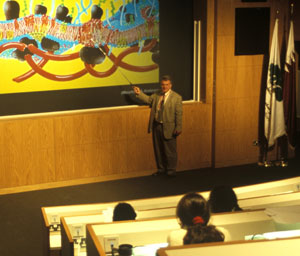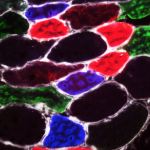Graduate Education
Weill Cornell Graduate School of Medical Sciences (WCGSMS)
For more than a half-century, WCGS has focused on preparing its students for careers in the biomedical sciences. The Graduate School faculty today numbers more than 250, and more than 1,000 students have earned Cornell University PhDs from the school.
Physiology, Biophysics and Systems Biology (PBSB)
The PBSB graduate program website includes exciting information about the research and academic activities of the Faculty engaged in world class research aiming to understand the functional mechanisms in the human body, in health and in disease.
Tri-I PhD Program in Computational Biology and Medicine (TPCBM)
The Tri-I PhD Program in Computational Biology and Medicine (CBM) was established in 2003 to provide a unique training opportunity that takes advantage of the exceptional educational and research resources of Cornell University in Ithaca, its Medical College in NYC (Weill Cornell Medical College), and Memorial Sloan Kettering Cancer Center. It is our belief that the development of such a cadre of computational biologists, trained in the laboratories of exceptional program faculty from all three campuses, will foster discovery in frontiers of basic biological and biomedical sciences.
Tri-Institutional PhD Program in Chemical Biology (TPCB)
The Tri-Institutional PhD Program in Chemical Biology was established in 2001 as one of the first graduate programs in the world to focus on research and training at the interface of chemistry and biology. The program is a collaborative offering of three premier New York City institutions, Weill Cornell Medical College, The Rockefeller University, and the Memorial Sloan Kettering Cancer Center. Located adjacent to one another in the heart of Manhattan’s Upper East Side, these three institutions combine to create a unique university environment and provide unparalleled scientific opportunities to the next generation of leaders in chemical biology.
Khurana Lab
The research interests of the lab fall under the broad categories of genomics, computational biology and systems biology. We participate in multiple international genomics consortia and collaborate with scientists at Weill Cornell to develop novel approaches to understand the role of sequence variants in human disease. The decreasing costs of genome sequencing are leading to a growing repertoire of personal…
Krumsiek Lab
We develop innovative systems biological data analysis approaches, with a special focus on metabolomics data from human samples. By combining large datasets from modern omics profiling techniques with advanced statistics and pathway analysis methods, we attempt to unlock the true potential of such big datasets. Our working hypothesis is that only analyzing omics datasets at the level of entire molecular pathways will provide enough statistical power and biological insights to generate novel targets…
Mendias Lab
Our lab is part of Weill Cornell and the Hospital for Special Surgery, which allows us to conduct cutting edge basic science research in musculoskeletal biology and then translate these findings to patients in the clinic. Our trainees have come from a variety of backgrounds, and include graduate students, postdoctoral fellows, and clinical residents and fellows that work together in…
Weinstein Lab
The Weinstein lab studies complex systems in physiology with methods of molecular and computational biophysics, bioinformatics and mathematical models. The work addresses structural and dynamic mechanisms in fundamental biological processes such as signal transduction, neuronal signaling and regulation of cell growth mechanisms, and the expression of these processes in the physiological functions of tissues and organs.









